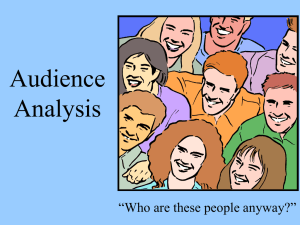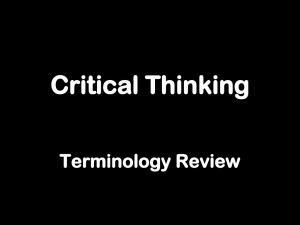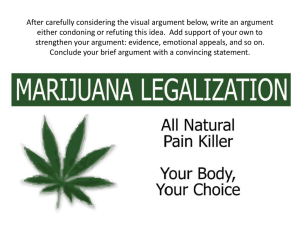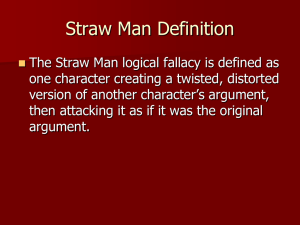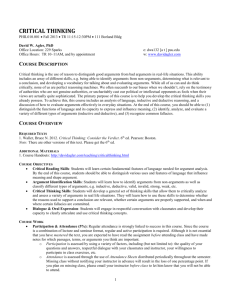argumentation
advertisement
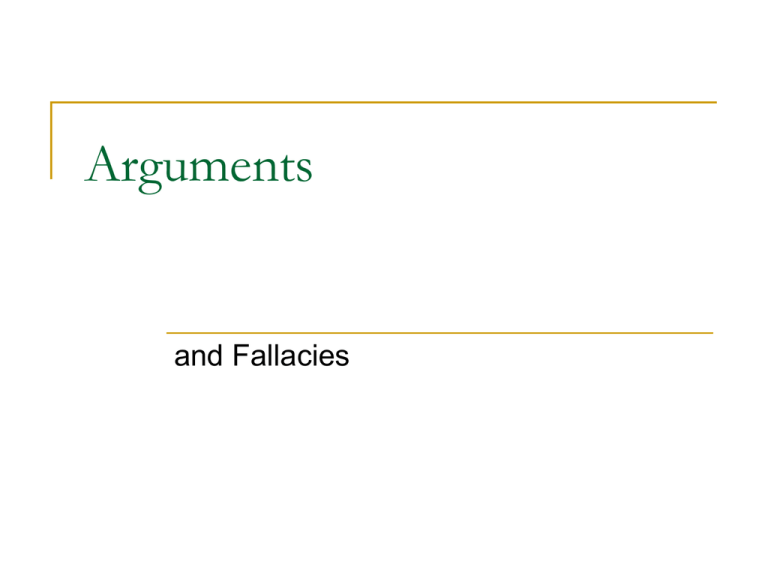
Arguments and Fallacies Argument Clinic http://youtu.be/kQFKtI6gn9Y What is an “argument”? Anger: Fight or quarrel Debate: Pro and con Programming: A parameter is a variable which takes on the meaning of a corresponding argument passed in a call to a subroutine. Although parameters are also commonly referred to as arguments, arguments are more properly the actual values or references assigned to the parameter variables when the subroutine is called at runtime. An argument isn't just contradiction. It can be. No it can't. An argument is a connected series of statements intended to establish a proposition. No it isn't. Yes it is! It's not just contradiction. Look, if I argue with you, I must take up a contrary position. Yes, but that's not just saying 'No it isn't.' Yes it is! No it isn't! Argument is an intellectual process. Contradiction is just the automatic gainsaying of any statement the other person makes. No it isn't. It is. Parts of an Argument ? An argument is a connected series of statements Assumptions, Evidence, Grounds Rules, logic, Conclusion(s) Purpose? Question, contrary position Persuade Convince What makes an argument Good vs. Bad? Valid Conclusion follows from the rules of logic If assumptions are accepted, then conclusion should be accepted Sound Assumptions are true Fallacy Faulty reasoning Fallacy The term "fallacy" does not mean false statement. It means faulty reasoning. It is possible for an argument to contain all true statements and still be fallacious. Deductive Arguments: Valid, Sound, Strong, Weak Deductive Arguments Valid Unsound Weak Arguments Invalid Sound Inductive Fuzzy Strong Arguments Fallacious Weak Arguments Fuzzy arguments Invalid wrt DEDUCTIVE logic No LOGICAL necessity Still can be STRONG arguments Still can be persuasive Still can be convincing Some Common Informal Fallacies Ad Hominem Argument Slippery Slope Argument Fallacy of Appeal to Authority False Cause Fallacy Begging the Question Fallacy of Composition/Fallacy of Division Fallacy of Ambiguity Appeal to the People (Argumentum ad Populum) The Many/Any Fallacy The Virtuality Fallacy Ad Hominem From Latin, "Ad Hominem" means "against the man" or "against the person." fallacies in which a claim or argument is rejected on the basis of some irrelevant fact about the person making the claim. Typically Person A makes claim X. Person B makes an attack on person A. Therefore A's claim is false. Fallacy: circumstances or actions of a person do not (in most cases) have a bearing on the truth or falsity of the claim. Example of Ad Hominem Jessie: "I believe that file sharing of music should be stopped." Ben: “You say that, but I noticed that you downloaded an MP3 today." Jessie: "What about the arguments I gave to support my position?" Ben: "Those don't count. You don’t practice what you preach, so I can't believe what you say." Another example of Ad Hominem? Clinton is an adulterer He lacks moral “character” ____________________ So, his policies are not good, and he will make a bad president Slippery Slope Fallacy (Camels nose) If you allow a camel to poke his nose into the tent, soon the whole camel will follow. Something is wrong because it could slide towards something that is wrong. Momentum: event A will initiate a process which will lead inevitably to event B. Domino Theory Gateway drugs, gun control will lead to gun confiscation Induction: like mathematical induction (almost) If Blacksburg is far from New York, then 1 mile closer is still far. So 2 miles closer is far, and 3, and 4…. Therefore n miles is far If 5 is a lot then 4 is a lot. If 4 is a lot, then 3 is a lot… If 1 is a lot then 0 is lot. If 0 is a lot then…. Affirming The Consequent logic reversal. A correct statement of the form "if P then Q" gets turned into "Q therefore P". For example, All people whose surname begins with Mac are of Scottish ancestry. Dougal is of Scottish ancestry. Therefore his surname begins with Mac." But actually his name is Campbell. Affirming The Consequent (example) Marijuana is a “Gateway” drug: Marijuana use leads to use of harder drugs. Marijuana use causes cocaine and heroine use. "Marijuana users are sixty-six times more likely to use cocaine subsequently than subjects who have never consumed marijuana.” “Cause” vs. “Symptom” ? 79% of regular marijuana users do not use any other illicit drug. False Cause (Correlation vs. Cause) False Cause (Correlation vs. Cause) "Every time my brother Bill accompanies me to Fenway Park, the Red Sox are sure to lose." The bigger a child's shoe size, the better the child's handwriting. When sales of hot chocolate go up, street crime drops. Begging the question Assuming the answer Tautology Circular reasoning The thing to be proved is used as one of your assumptions. Big circles vs. small circles Circular reasoning For example “You can’t give me a C. I’m an A student!” "We need the death penalty to discourage violent crime". This assumes it discourages crime. "The stock market fell because of a technical adjustment." But an "adjustment" IS just a stock market drop Fallacy Of Composition Assuming that a whole has the same simplicity as its constituent parts. "A car makes less pollution than a bus. Therefore, cars are less of a pollution problem than buses." "Atoms are colorless. Cats are made of atoms, so cats are colorless." Fallacy Of Division Assuming that what is true of the whole is true of each constituent part. Human beings are made of atoms, and human beings are conscious, so atoms must be conscious. Non Sequitur Latin for "it does not follow." For example, "Tens of thousands of Americans have seen lights in the night sky which they could not identify. The existence of life on other planets is fast becoming certainty!" "Bill lives in a large building, so his apartment must be large." Statistics President Dwight Eisenhower expressed astonishment and alarm on discovering that fully half of all Americans had below average intelligence. Most 3rd graders read at or below 3rd grade level “Regression to the mean“ = extremes tend to go back to normal. E.g. cures. a variable that is extreme on its first measurement will tend to be closer to the centre of the distribution on a later measurement Straw Man Fallacy Of Extension Attacking an exaggerated or caricatured version of your opponent's position. “Evolution means a dog giving birth to a cat." "Senator Jones says that we should not fund the attack submarine program. I can't understand why he wants to leave us defenseless like that." Fallacy of Appeal to Authority Fallacy of Ambiguity Appeal to the People (Argumentum ad Populum) The Virtuality Fallacy Because something happens in "virtual space" (computer, Internet) that it is not real Slander on websites Using false virtual identity to trick someone How do you make a good argument? Change thinking Follow the leader Clear connection between the parts Developing an argument Claim Statement you want someone to accept Why? - Context Who? - Audience Who are you to them? - Author Reason, Evidence Context Motivation Interests Social context Message Logos • Logic • Internal consistency • Reason, evidence Writer / speaker Ethos Reader / listener Pathos • Credibility • Trustworthiness • Appeal to • Engage emotionally An argument isn't just contradiction. It can be. No it can't. An argument is a connected series of statements intended to establish a proposition. No it isn't. Yes it is! It's not just contradiction. Look, if I argue with you, I must take up a contrary position. Yes, but that's not just saying 'No it isn't.' Yes it is! No it isn't! Argument is an intellectual process. Contradiction is just the automatic gainsaying of any statement the other person makes. No it isn't. It is. Claim Cyberethics does NOT introduce new ethical issues. Computing introduces new puzzles and dilemmas Such as? What is an “ethical issue“? What might a new ethical issue be? Cyber-Ethics Assignment Write a well-formed, OUTLINE for a 5-paragraph (intro, 3 body points, conclusion) essay that argues the following: Cyberethics does NOT introduce new ethical issues. Be sure to recognize the following understanding: Computing introduces new conceptual puzzles and dilemmas related to ethics (cyber-ethics) that Tavani refers to as "conceptual muddles". These can lead to "policy vacuums". We can distinguish between unique technological features and unique ethical issues. New technologies and their capabilities can introduce "conceptual muddles" and/or "policy vacuum", but we should be careful to distinguish "policy vacuums" and "unique ethical issues". Arguments can be explicit or implicit Implicit: Describe a photograph that would create an implicit argument persuading The general public toward banning handguns The general public against banning handguns Advertising Psychology, communication Explicit Argument Requires Justification of it’s claims An argument? Argument is an intellectual process. Contradiction is just the automatic gainsaying of any statement the other person makes. Truth seeking + persuasion Exploratory Essay Inquiry: Think out loud Dialog: seeking common ground Classical Argument aimed as skeptic One-sided: preaching to the choir Aggressive one-sided Political rally Propaganda Reading Arguments 5 strategies Read as a believer Read as a doubter Explore how the rhetorical context and genre are shaping the argument. Seek alternative views and analyze sources of disagreements Use disagreement productively to prompt further investigation Read as a believer Empathetic listening Suspend your doubt when summarizing Give the other side it’s BEST shot Don’t be afraid to offer positive examples etc. “What you are trying to say is…” Say it in such a way that THEY agree that is what they said Make implicit assumptions explicit THEN proceed to argue Read as a believer E.g CS needs a code of ethics (or not). Cyberethics does NOT introduce new ethical issues. Evidence? Best example? Read as a doubter Seek not the answers, but to understand the QUESTIONS List assumptions, and challenge Categorize counter-examples (and support) Focus on key terminology that reveals bias too strong Loaded (value laden, ideology, etc.) Rhetorical context and Genre Personal correspondence Letter to editor Op-ed Niche magazine (e.g. Beginner’s Guides) Scholarly journal White papers Proposals Legal briefs Advocacy Advertisement Blogs, forums Visual argument Speech Questions to ask What is the authors interests / investment? Who is the audience? What is motivating the writing? What genre? What info about the publication helps explain the angle? Seeking Alternative Views Disagreement about facts Global warming? Disagreement about Values Ethics? Politics? Religion? Using disagreements productively Accept ambiguity or uncertainty Consider synthesis as a solution Describe as a dilemma You have 2 (or more) choices You MUST make a choice ALL of your choices stink Sources, References for facts / data Statistics Studies Context of data Sources, facts, data Statistics, Studies Stories Testimony / witness Memory Evidence Physical Analogical / Model Circumstantial (indirect – inference from another fact) Opinions Description, analysis, decomposition, logic? Consider ways to synthesize views Define YOUR values Reader Response Theory recognizes the reader as an active agent who imparts "real existence" to the work and completes its meaning through interpretation. (no meaning w/out reader – if a tree falls…) Reader-response criticism argues that literature should be viewed as a performing art in which each reader creates his or her own, possibly unique, text-related performance. It stands in total opposition to the theories of formalism and the New Criticism, in which the reader's role in re-creating literary works is ignored (meaning is objective). There is NO authoritative or privileged interpretation Take a 3rd position that reconciles two sides Provide multiple or hypothetical resolutions
